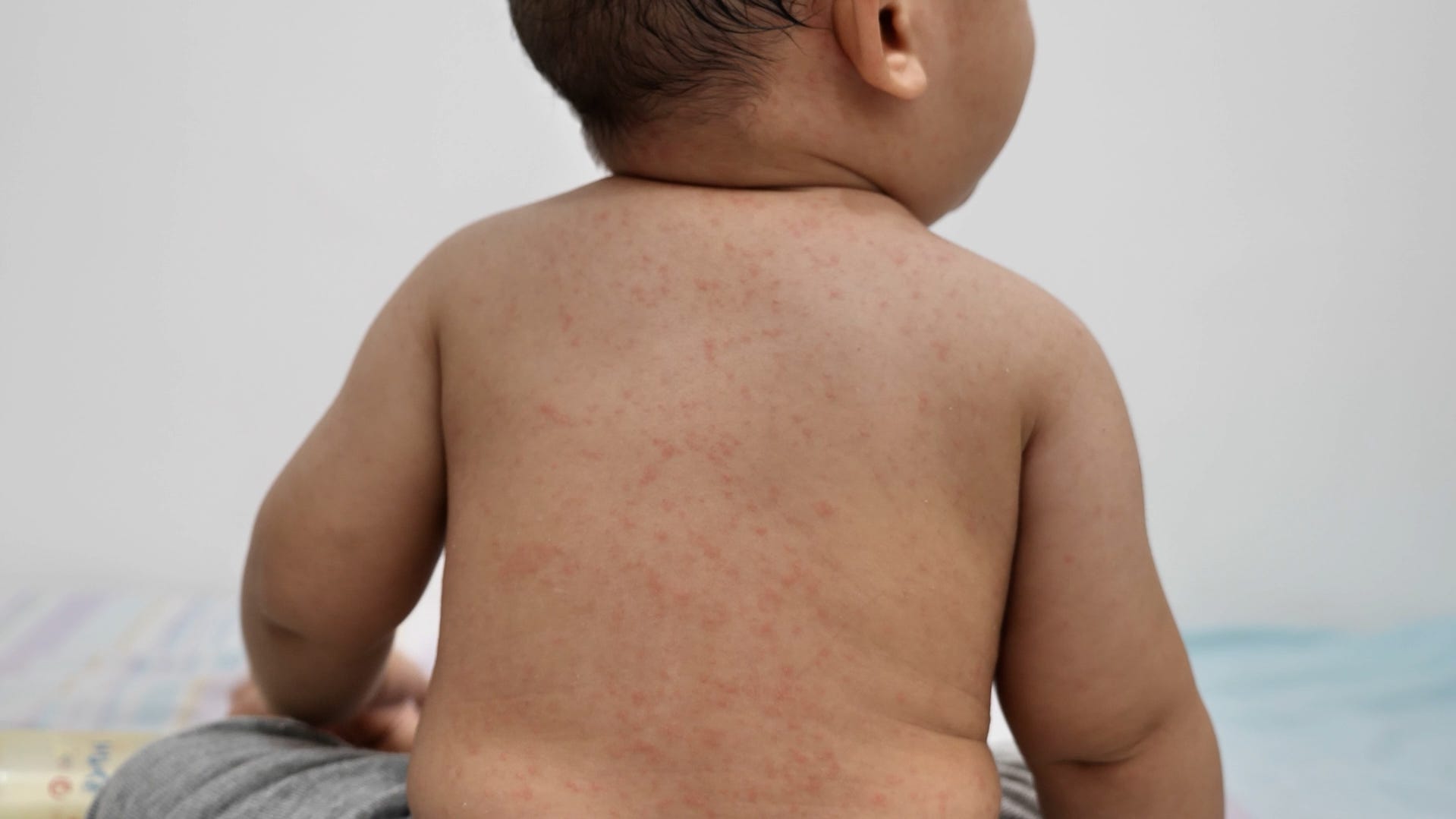A second child has died from measles in the US: See latest map of cases amid outbreak

- A second child died from measles in Texas on Thursday, April 3.
- The CDC reported that 607 measles cases have been confirmed in 22 U.S. jurisdictions, as of April 3.
- In an X post on Sunday, Health and Human Services Secretary Robert F. Kennedy Jr. said the most effective way to prevent the spread of measles is by getting the MMR vaccine.
A second child has died from measles amid an ongoing outbreak that is sweeping across the country.
The school-aged child, who was unvaccinated and had no underlying health conditions, died from measles pulmonary failure while hospitalized on Thursday, the Texas Department of State Health Services reported. The death is the second in Texas since the measles outbreak began in January.
Health and Human Services Secretary Robert F. Kennedy Jr. said in an X post on Sunday that he visited Gaines County, Texas to "console the families and to be with the community in their moment of grief."
The "most effective way" to prevent the spread of the virus is to get the vaccine for measles, mumps and rubella (MMR), Kennedy wrote in his post.
Kennedy has routinely been criticized for his controversial history of questioning the effectiveness of vaccines, including falsely linking them to autism. Most recently, he's encouraged people with the measles virus to be treated with Vitamin A and cod liver oil, though multiple children needed treatment for Vitamin A toxicity last week.
Kennedy's recent statement on the vaccine has surprised several medical professionals, including London-based infectious disease specialist Dr. Neil Stone.
"Words I never thought I would hear Robert F Kennedy Jr. say," Stone said in an X post on Sunday. "He's absolutely 100% correct, and I'm encouraged that he is speaking responsibly about measles in the face of this tragic outbreak."
How many measles cases are there in the US?
The Centers for Disease Control and Prevention confirmed 607 measles cases across 21 states, as of Thursday, April 3, including: Alaska, California, Colorado, Florida, Georgia, Kansas, Kentucky, Maryland, Michigan, Minnesota, New Jersey, New Mexico, New York, Ohio, Oklahoma, Pennsylvania, Rhode Island, Tennessee, Texas, Vermont and Washington.
As of Sunday, in Texas alone, 481 cases had been confirmed, the Texas Department of State Health Services said.
Can't see the graphic in your browser? Visit public.flourish.studio/visualisation/22523436/.
What is measles?
Measles is a highly contagious, vaccine-preventable disease caused by a virus that primarily, and most severely, affects children. Measles infects the respiratory tract before spreading throughout the body, according to the World Health Organization.
The virus is one of the most contagious infectious diseases to exist. 90% of unvaccinated people who are exposed end up contracting it. Additionally, one in five of those people end up hospitalized, according to the CDC.
What are measles symptoms?
Common measles symptoms include high fever, cough, runny nose and watery, red eyes. Some people will develop a flat, reddish-brown facial rash that eventually spreads to the neck, torso and rest of the body. When the rash appears, a person's fever may spike to more than 104 degrees Fahrenheit. Symptoms tend to appear a week or two after infection.
People are most contagious about four days before the rash appears and for about four days afterward. During this time, infection individuals should quarantine.
Other signs and symptoms of measles include:
- Loss of appetite and diarrhea
- Koplik spots, tiny white spots that may appear inside the mouth two to three days after symptoms begin
- Small raised bumps may also appear on top of the flat red spots (the spots may become joined together as they spread from the head to the rest of the body)
Can you get the measles if you have been vaccinated?
Yes, individuals who have been vaccinated with the MMR vaccine can still contract the virus, but it's rare.
Roughly three out of 100 people who have received the two-dose vaccination may contract the virus when exposed, according to the CDC. Their symptoms tend to be milder and they are less likely to spread the virus.
Do adults need a measles booster?
Most vaccinated adults are immune to measles and do not need a booster shot, according to the National Foundation for Infectious Diseases.
Editor's note: The map in this story has been updated.
Contributing: Natalie Neysa Alund, Paste BN
Greta Cross is a national trending reporter at Paste BN. Story idea? Email her at gcross@usatoday.com.